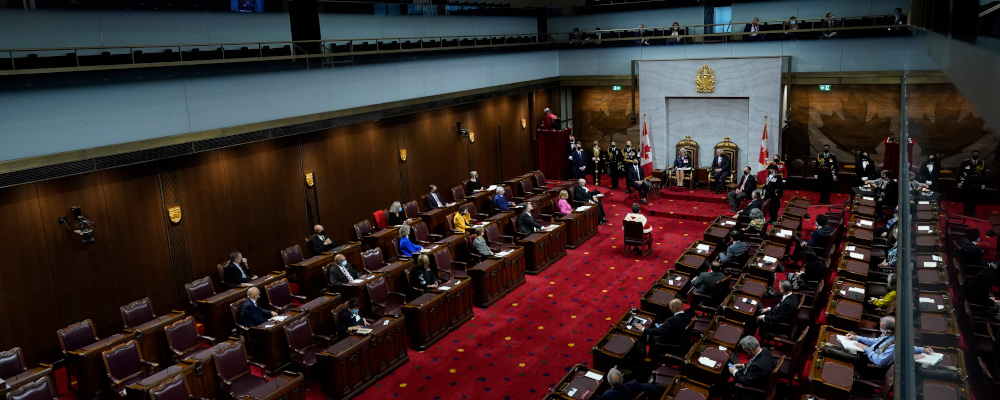The Senate is currently debating a motion based on the latest of 13 reports from a special committee on modernization that was struck six years ago. The Senate’s rules still presume a traditional adversarial structure with a government caucus and an opposition, but that is increasingly challenging in a 105-seat chamber that now includes an official government representative, 13 members of an official opposition caucus, with the rest divided between independents and three loose parliamentary “groups.”
Senator Marc Gold is the government representative in the Senate. His job includes getting the government’s legislative agenda passed and answering questions on behalf of the government in the Senate. Senator Gold isn’t officially even a Liberal (although he is a member of the Liberal government’s Cabinet operations committee.) He describes his relationship to the government as similar to that of a lawyer to a client.
The Conservatives don’t buy it. They view Senator Gold as a Trudeau puppet as they do most of the other eighty-one “independent” senators appointed by Prime Minister Trudeau. An objective analysis suggests they have a point. Without casting aspersions on the integrity of any senator, Trudeau’s appointments are not a representative cross-section of “independent” Canadian political perspectives. There is a relatively cohesive ideological conformity that is mostly aligned with the current Liberal Party.

So far, there has not been any reason to question these new senators’ genuine commitment to public service, which has included a general sensitivity about an unelected Senate impeding the will of the elected House of Commons. But restraint is much easier when the Senate is politically inclined toward the government. What happens when legislation from a future Conservative government runs into a Senator’s strong ideological commitments? Is there an expectation that senators with deeply held convictions will pass legislation they believe is wrong? Will a senator committed to fighting climate change by any means just go along with a bill repealing the federal carbon tax?
Senate shenanigans impeding legislation have occurred before over issues that were more pragmatic than reflective of deeply held convictions. Recall 1990, when then-Opposition Leader Jean Chretien mused that his senators were considering “killing” Brian Mulroney’s proposed GST bill in the Senate. The issue was sidestepped through a rare constitutional provision, by which Mulroney was able to appoint eight additional senators and the bill cleared the Senate by just two votes. The decision of the next Liberal government to retain the GST proved the senators’ concern was more political than principled.
There will always be a temptation to politicize the Senate’s constitutional powers, but the partisan system that prevailed before Justin Trudeau began appointing “independent” senators checked that temptation. It meant that if a party’s senators blocked legislation that had been approved by the elected majority in the House of Commons, there could be political consequences for the party’s brand in the next general election. The new “independent” model has removed the indirect accountability that might discourage such an abuse of the Senate’s power.
Because some of the new “independent” senators may believe that they were appointed on the basis of their individual merits, they may be emboldened—or even expected—to exercise their newfound political power to thwart the democratically elected House of Commons in a way that partisan appointees did not. If that is how they come to feel and act, there is nothing a future government can do about it. A 2014 Supreme Court opinion said that even something as relatively minor as imposing Senate term limits would require broad federal-provincial agreement, which means new constitutional limits on the Senate’s powers that are all but impossible. As a result, Senate reform has mostly vanished from the federal agenda.
Except that while no one was paying much attention, Senate reform has happened.
The consequence of eliminating the Westminster structure of government and opposition caucuses in the Senate while leaving its constitutional powers intact may prove more consequential than many of the previously debated Senate reforms. The idea of the Senate as a regional and partisan chamber of “sober second thought” has been functionally replaced with the idea of the Senate as a political check on the House of Commons. And under a new Conservative government, a Liberal-appointed Senate majority could also become an ideological check on the government’s agenda. If so, Prime Minister Trudeau will have achieved more by fiat than his predecessors ever attempted through constitutional reform.
The old Senate model worked because partisan appointees saw themselves as secondary legislative players to the elected House of Commons and they brought that attitude to the scrutiny of legislation, even—or especially—legislation they disagreed with. Senators reviewed and suggested revisions to legislation, tested policy evidence at hearings, and conducted independent studies conscientiously and with integrity, but also with political modesty. The understanding was that the Senate might occasionally balk at the government’s agenda, but ultimately it would back down.

There were only a handful of notable exceptions to the rule, but they stand out because they were so rare. Famously, in 1988, a Liberal majority in the Senate defeated the Conservative government’s free trade bill. In response, Mulroney dissolved Parliament and in the subsequent election he received a strong electoral mandate for free trade with the United States. His newly-elected government reintroduced the bill and this time the Senate stood down and passed it.
Would a Senate dominated by a relatively narrow ideological perspective broadly aligned with the previous government and untethered from public opinion be so acquiescent? Unshackled from formal partisan affiliation, will senators feel entitled to stare down elected MPs and block a government agenda they oppose? If they want to do so, they will certainly have the votes. Given that senators can serve until their 75th birthday, even if the next government wanted to rebalance the present ideologically unrepresentative makeup of the Senate, it would take the better part of a decade to do so. (Of course, seeking to achieve “ideological representativeness” by appointment is a fraught and subjective process at the best of times.)
If a majority of the Senate chose to block or severely delay a Conservative government’s legislative agenda, it would plunge the country into a constitutional crisis the likes of which we have not seen in more than a century. The fact that individual senators who “resisted” a Conservative government would likely be feted by many Laurentian elites as political heroes would only highlight the Senate’s democratic deficit and exacerbate the institutional damage. And with no realistic path to constitutional reform, we could see our politics take a dark, but not unprecedented, turn.
Given the way that the Senate’s political makeup trails democratic changes in the House, it is surprising that we have not been pushed to this constitutional precipice before, but it has happened elsewhere. In 1911, the British Liberal Party proposed a radical program of new taxes to fund social programs known as the “People’s Budget.” In a clear breach of constitutional convention, the House of Lords—whose members, incidentally, stood to lose the most financially—voted it down, triggering a constitutional crisis.
As in Canada in 1988, it took an election in which the country at large broadly endorsed the Liberals’ budget to force the Lords to blink. Even then, it required the additional threat by the government (with the backing of the King) to appoint dozens of new peers to swamp the existing majority in the Lords—an option not available to a Canadian prime minister, who can only appoint up to eight additional senators above the usual constitutional limit of 105—for the House of Lords reluctantly to back down.
To avoid a future showdown with the Lords, the government introduced and passed the Parliament Act 1911, which provided that henceforth the unelected Lords could delay, but not block outright, the passage of legislation.The initial two-year delay period was later shortened to one year pursuant to the Parliament Act 1949. This legal restriction was later supplemented by a new constitutional convention to reinforce the principle of democratic control of parliament. Known as the Salisbury-Addison Convention,After the leaders, respectively, of the Labour and Conservative parties in the Lords at the time. it provides that the House of Lords will quickly pass legislation that was specifically mentioned in the government’s election manifesto (platform).
Both measures would be wise additions to the Canadian constitutional order, regardless of how the Senate responds to the next Conservative government, but we hope that neither will be necessary. A constitutional crisis precipitated by overweening Senators attempting to stymie an elected government’s legislative agenda would be a disaster for the Senate and the country. Canadian politics would grind to the kind of impasse that is only broken by the kind of extraordinary force whose political and social repercussions are unpredictable.
Throughout Canadian history, the Senate’s constitutional legitimacy has depended on its members’ political restraint. Our Senate functions best when its members work diligently and conscientiously, but always with a nagging awareness of their democratic illegitimacy. They may oppose the government vocally, but not politically. They may push back occasionally, as long as they yield in the end. Should the Senate face a Conservative government with an ambitious legislative agenda after the next election, all Senators would be wise to remember that.
Recommended for You

Scandalous politicians could finally face serious consequences if this Supreme Court case is won, says democracy watchdog

Don’t downplay the costs of the AI revolution: The Weekly Wrap

‘It’s in the Liberals’ interest’: The Roundtable on whether Trump’s antics will trigger an early election

‘Immense horror’: Iranian regime marks 47 years of Islamic rule amidst mass killings of protestors



